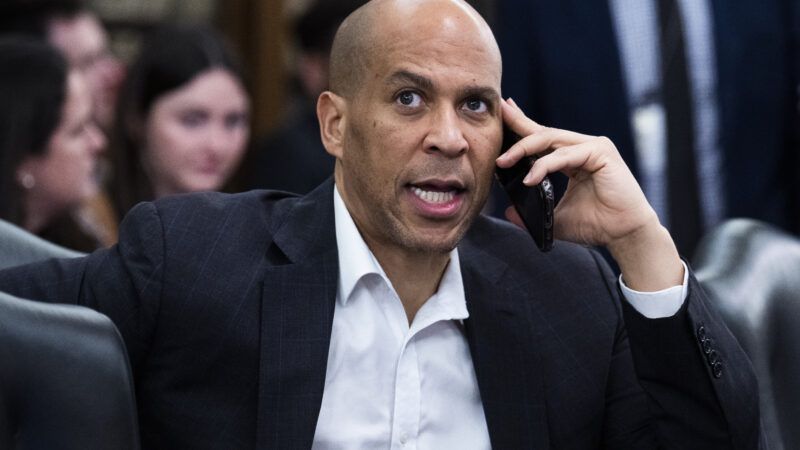This Bill Aims To Reduce Mass Incarceration by Encouraging States To Cut Their Prison Populations
The legislation, whose authors say two-fifths of prisoners are locked up without a "compelling public safety justification," would reward states that take a more discriminating approach.

In thinking about the purpose of incarceration, the late criminologist Mark Kleiman argued, it is important to distinguish between "people we're mad at" and "people we're afraid of." Kleiman added that, in light of research indicating that deterrence hinges on the probability of punishment more than its severity, "long prison terms are wasteful government spending." A bill that Sen. Cory Booker (D–N.J.) and Rep. Tony Cárdenas (D–Calif.) introduced yesterday aims to apply those insights by using federal grants to encourage reductions in state prison populations.
"Over 1.2 million individuals are imprisoned in federal and state facilities, with an additional 636,000 locked up in local jails," a press release from Booker's office notes. "Data have shown that there is no compelling public safety justification for nearly 40 percent of the prison population to remain incarcerated."
Booker is referring to a 2016 report from the Brennan Center for Justice, which analyzed the crimes committed by state and federal prisoners based on four factors: seriousness, victim impact, intent, and recidivism. The report's authors estimated that 39 percent of prisoners "are incarcerated with little public safety rationale."
Some of the judgments underlying that estimate are debatable. For example, the authors accepted the premise that drug trafficking is a serious crime, even when it involves nothing more than consensual transactions between adults. And they focused on three-year recidivism rates, which may not give a full picture of the threat that a given prisoner might pose to public safety.
Still, the Brennan Center report rightly argued that the treatment of low-level, nonviolent drug offenses, especially possession for personal use, is excessively severe, and it drew useful distinctions among predatory criminals. The burglary category, for instance, encompasses a wide range of conduct, including nonviolent invasions of unoccupied structures. However one might quibble over the details, the overall point is sound: Any attempt to substantially reduce the prison population will depend on doing a better job of identifying offenders we are appropriately "afraid of" and realistically appraising the benefits of keeping people behind bars.
Toward that end, the legislation that Booker and Cárdenas have proposed, the Smart Sentencing Adjustments Act, would offer "planning" and "implementation" grants to states that are interested in making more just and cost-effective decisions about who should be imprisoned and for how long. Building on a proposal that the Brennan Center published in March, the bill would offer additional money to states that succeed in reducing their prison populations by 20 percent over three years. Grant recipients would be required to eschew "overly punitive sentencing laws that do not have evidence-based effects on crime, such as mandatory minimum rules or truth-in-sentencing statutes."
Those incentives, the Brennan Center argues, could have a meaningful impact on the number of prisoners. "If the 25 states with the largest prison populations met the bill's 20% goal," it says, "179,000 fewer people would be behind bars—more people than are currently incarcerated in the entire federal prison system."
One might object that Congress has no business injecting itself into state criminal justice policy. But Congress has been doing that for many years by encouraging the "overly punitive sentencing laws" that have contributed to America's astonishingly high incarceration rate. Even if you discount the official figures from authoritarian regimes such as China and Russia, the U.S. locks up a much larger share of its population than other liberal democracies do.
That situation is mainly the result of state policy decisions. But Congress, which eliminated federal parole in 1987 and has ratcheted sentences up for decades, establishing myriad mandatory minimums, has led by example, and it has encouraged states to follow that example by offering financial incentives. The Violent Crime Control and Law Enforcement Act of 1994, for example, provided $10 billion in subsidies for state prison construction, contingent on passage of "truth in sentencing" laws that limited or abolished parole.
That law, which our current president was proudly calling "the 1994 Biden Crime Bill" as recently as 2015, took effect after a long decline in the violent crime rate began in the early 1990s. More generally, there is much debate about the extent to which mass incarceration contributed to that downward trend. The Brennan Center argues that "rigorous social science research based on decades of data shows that increased incarceration played an extremely limited role in the crime decline."
Even if you credit the expansion of the prison population with more than an "extremely limited role," that does not necessarily mean it makes sense to double down on the policies driving that trend. "The crime-reduction gains from higher incarceration rates depend critically on the incarceration rate itself," a 2014 Brookings Institution report noted. "When the incarceration rate is low, marginal gains from increasing the incarceration rate are higher. This follows from the fact that when prisons are used sparingly, incarceration is reserved for those who commit the most serious crimes. By contrast, when the incarceration rate is high, the marginal crime-reduction gains from further increases tend to be lower, because the offender on the margin between incarceration and an alternative sanction tends to be less serious. In other words, the crime-fighting benefits of incarceration diminish with the scale of the prison population."
Whatever your take on these questions, conservatives should be able to agree with progressives that the public safety benefits of incarceration, whether from deterrence or incapacitation, depend on distinctions that current sentencing policies frequently fail to draw. "The Smart Sentencing Adjustments Act is a sensible solution that both Republicans and Democrats can support," says the Due Process Institute's Jason Pye. "This bill would help preserve law enforcement tools that protect public safety, stop the revolving prison door, and give real second chances to people who have been unnecessarily incarcerated and shut out from society."
